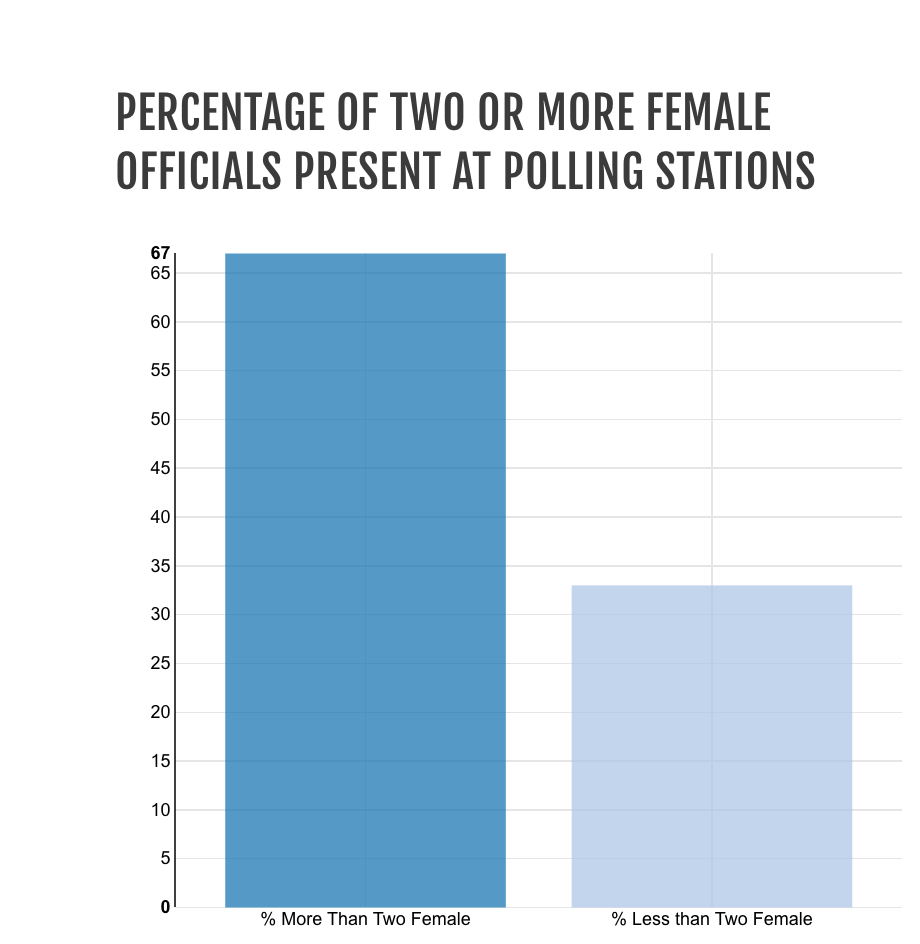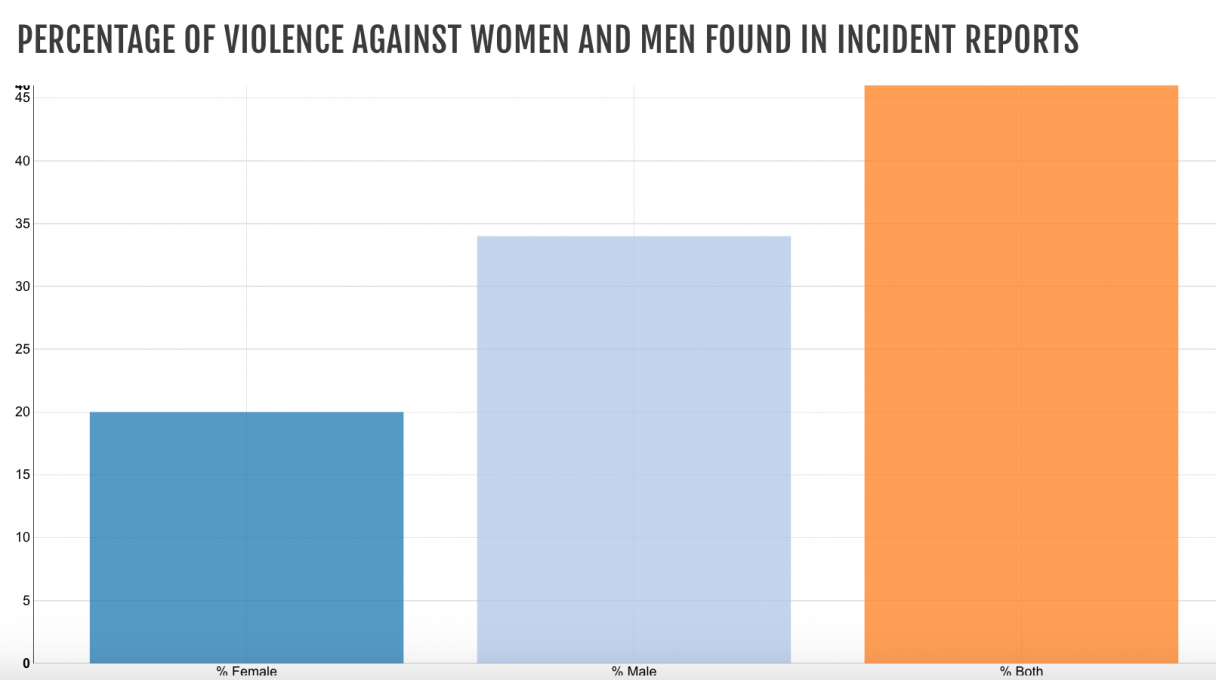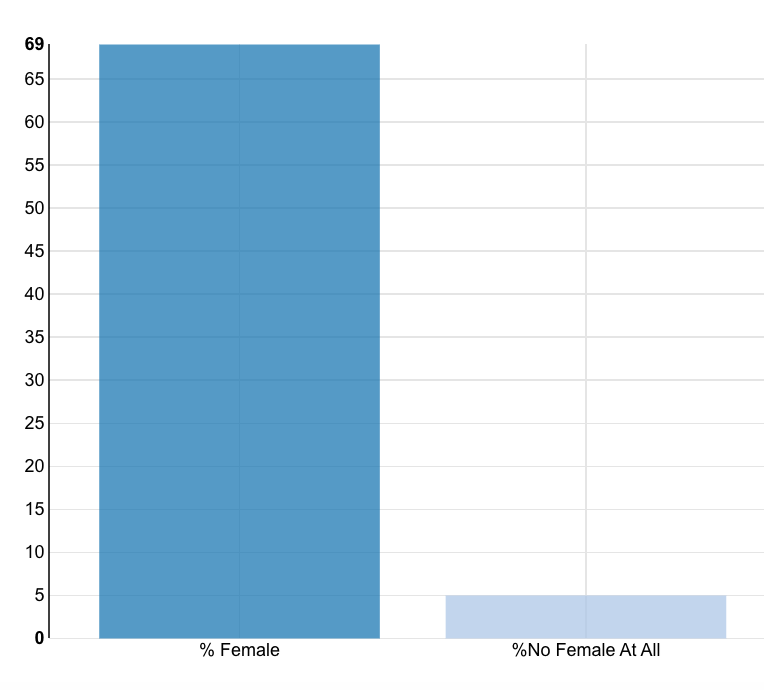
NATIONAL ELECTION 2017
Although 73 percent more women stood as legislative candidates in 2017 as compared to 2011, ultimately the share of women representatives remains unchanged with 9 out of 73 representatives, or 12.3 percent. This figure is well below the regional and global average of 23.5 percent.
On October 10, 2017, Liberia held its general elections, with former footballer George Weah winning 38.4 percent of the vote and incumbent Joseph Boakai winning 28.8 percent. With neither reaching an outright majority of the vote (over 50 percent), a run-off election was held on December 26, 2017 between the two candidates. George Weah was pronounced the winner on December 28, 2017 by the Electoral Commission, with 61.5 percent of the votes.
Although the Presidential and Parliamentary elections were transparent, largely peaceful, and competitive, Liberian women continued to face significant barriers to contesting and winning elected office. For the presidential election, there were 20 registered candidates, only one of which was a woman. However, six women ran for vice president out of twenty total candidates. For the House of Representatives, 983 candidates, of which 156 were women (16 percent), contested 73 seats.
To help safeguard the integrity of the electoral process, the National Democratic Institute (NDI) fielded a comprehensive international observation mission (IOM), and also provided technical and financial support to the Elections Coordinating Committee (ECC). The ECC is a nonpartisan network of civil society organizations that monitors, documents, and reports on election issues to promote transparency and accountability in Liberia and strengthen the democratic process. The ECC was formally established in 2011 jointly with the following member organizations: the Institute for Research and Democratic Development, Actions for Genuine Democratic Alternatives, the National Youth Movement for Transparent Elections, the Center for Media Studies and Peace Building, and the West Africa Network for Peace Building.
BEFORE THE ELECTION
As part of the IOM, NDI conducted two pre-election assessment missions comprising political leaders and experts from across the African continent and the world. The first occurred in February of 2017. Within NDI’s published observations and recommendations from the assessment mission, the delegation noted that they found particular barriers facing women who were seeking to register to vote. The delegation heard reports that many women found it difficult to visit registration centers during the opening times for various reasons. For example, female workers reportedly were not always able to receive permission to leave work to register.
To make registration more accessible to voters, the National Elections Commission (NEC) added 300 new registration centers, raising the total from 1,780 in 2011/2014 to 2,080. This helped improve access for rural voters in particular, though some still had to walk for several hours to the nearest registration center. The issue of distance presented a challenge for elderly voters, women, and persons with physical disabilities. Women tend to have more household duties and responsibilities, limiting their participation and ability to walk to their nearest registration center. Women also face security concerns related to walking long distances after dark. In addition to accessibility barriers to registering, Liberian women also have lower literacy rates and financial barriers which disproportionately inhibit their ability to access information about the election process and avenues for political participation.
In Liberia, it is commonly believed that the public sphere is not a woman’s place and traditional and religious views tend to confine women to household roles. For many women, the potential reactions of their husbands, families and communities deter them from entering in politics. The reported level of lifetime physical and/or sexual intimate partner violence against women in Liberia, is 39 percent. Experience suggests that taking the views on women’s political participation, rates of violence against women, and the competitiveness of the Liberian elections, there is a high probability that VAW-E was occurring in the private sphere.
The ECC also observed the voter registration process during the pre-election period and collected incident forms. Voter registration was conducted from February 1 to March 14, 2017. The ECC deployed to a total of 73 constituency observers and 16 county coordinators. There was no violence against women recorded by ECC observers in public registration locations. The ECC has also noted that while the election law that was amended in 2014 to include a provision that stipulates that political parties “should endeavor” to reach at least 30 percent women on their candidate lists (Section 4.5 of Liberia’s New Election Law), female candidates represented less than 16 percent of the total number of registered candidates for the 2017 elections. Only one out of 26 parties, the Liberia Restoration Party (LRP), reached the 30 percent benchmark. The LRP is also the party that nominated the only female presidential candidate. Three political parties – Alternative National Congress (ANC), All Liberia Party (ALP), and Unity Party (UP) – had between 14 and 20 percent representation of women candidates.
As candidates, women faced many obstacles to being nominated and running for office. Women aspirants expressed to the international observation delegation that they did not hear political parties discuss the 30 percent provision. Many women also faced unfair practices in candidate selection that compromised their ability to secure their party’s nomination. For example, some women candidates received assurances from party leaders that they would run unopposed, only to find last-minute that a man backed by party leaders entered the race. Some women were told they needed to bribe party leadership to be selected. Women also struggled to obtain the endorsements of traditional leaders and received less media coverage than their male counterparts as a result of cultural bias.
Liberian citizen observer groups also informed the delegation about accounts of VAW-E that was occurring through smear campaigns and insults against women candidates on social media and in public places, as well as, reports of physical intimidation and threats against female candidates. Unfortunately, reports of incidents such as these were not systematically collected during the pre-election period.
ECC DATA FROM ELECTION DAY
On October 10, Liberia held national elections. The ECC deployed 2,170 trained and accredited observers across all 73 districts of Liberia. These included 170 mobile observers and 2,000 polling place observers. Of the 2000 observers, 832 were systematically deployed as Rapid Response Observers, 498 of which were deployed based on a proportional distribution by district. To administer the 2017 elections, each of the country’s 5,390 polling places were staffed by five polling officials, one of whom was a presiding officer. At least two NEC staff in 67 percent of the 496 observed polling places (334 polling places), had two or more female election officials and 22 percent (109 polling places) had a female presiding officer.
Based on reports from ECC observers deployed to polling stations in all 73 districts, the election day was largely peaceful, with a low amount of violent incidents reported to the ECC and other observer missions. Out of 140 total (violent and non-violent) incident reports, 13 percent (18 cases) were marked as incidents of violence against women, including incidents of intimidation, harassment, threats and physical violence. A further 7 percent (10 cases) were marked as incidents of violence against men. The reports indicate that in some cases, the perpetrators of the violence were both men and women. Some of these reports might reflect election day turmoil with long lines of voters wanting to vote, including pregnant or elderly women not given special consideration to be able to vote quicker than others.

How Many Polling Stations Had Two or More Women Officials Present?
How Many Polling Stations Had a Female Presiding Officier?

What Percentage of Violence Against Women Was Reported On The Incident Forms From Liberia?
ECC DATA FROM THE RUN-OFF ELECTION
On December 25, Liberia held a run-off election. Of the ECC’s 1,100 observers, 832 were systematically deployed as Rapid Response Observers and 498 were deployed based on a proportional distribution by district. While 69 percent of the 494 polling places (340) observed by the ECCs had at least two female NEC staff.
There were only two incidents of violence reported by observers, neither of which involved female victims.

How Many Polling Stations Had Two or More Women Officials Present?
PERCENTAGE OF TWO OR MORE FEMALE OFFICIALS PRESENT AT POLLING STATIONS RUNOFF
NDI’s IOM CONTEXTUAL ANALYSIS
NDI’s IOM found in its final report that VAW-E is a longstanding challenge in Liberia that presents significant barriers to women’s participation and affects electoral integrity more broadly. The country’s legal framework fails to address gender-based violence specifically in the context of elections. Liberia is party to the Istanbul Convention on the Elimination of All Forms of Violence Against Women and Girls, and has a set of laws against various instances of sexual and gender-based violence, focused on rape and domestic violence. However, the election law does not address the question of violence, and neither do the Ganta and Farmington River Declarations address violence against women in their commitment for violence-free elections. All five types of VAW-E (physical, sexual, psychological, threats and coercion and economic violence) occurred during Liberia’s 2017 elections and affected to varying degrees women voters, election workers, activists, and aspirants.
Several women candidates experienced threats and intimidation. The Liberian Women National Political Forum documented more than a dozen incidents against women, including a direct physical threat. NDI was informed of an instance of where a candidate was physically forced off the stage at her campaign event, and her billboards were destroyed. Presidential candidate MacDella Cooper was the victim of threats, some from the leadership of her own party. Some candidates also experienced theft and destruction of their campaign material. Others reported being victims of intimidation and threats based on traditional rituals barring women from certain areas. During the election dispute process between the two rounds, the house of a woman associate justice of the Supreme Court had rocks thrown at it.
The NDI mission also received direct testimonies of instances of psychological violence against women candidates such as smear campaigns and insults on social media and in public places. The monitoring efforts of UN Women, Women’s NGO Secretariat of Liberia (WONGOSOL), and Liberia New Narratives confirmed that social media platforms were the most common site of reported incidents of VAW-E, including the dissemination of naked images of an aspirant. These instances of psychological violence were under-reported during the election period, as they are not necessarily identified by the victims themselves as incidents of violence. Women incumbents pointed out that, while the number of incidents may have been similar in 2011 and 2017, their impact in today’s context was far more significant and long-lasting, given the increasing role of social media in spreading such incidents.
NDI also observed derogatory comments and accusations in traditional media referring to women candidates’ personal lives, questioning their morality, and focusing on their marital status to disavow their capacity to govern. During the nomination period, several women candidates faced biased, negative reporting and derogatory comments on talk show programs, though the nature of the coverage improved as the campaign period progressed. In one particularly stark example, on October 26 the Corruption Watch newspaper accused Ms. Howard-Taylor of having “unstable relationships” with a number of men. In an editorial the paper openly urged people not to vote for her because “we feel she has not lived a good moral life to set an example for the younger generation of girls.” The editorial went on to say: “We are therefore of the opinion that when she is elected, female prostitution may be on the rise.”
Other civil society organizations did a robust job in monitoring, mitigating and preventing violence against women during the elections.The UN Peace Huts network operated in more than 20 communities to mobilize female peace leaders to promote violence free elections and engaged in mediation to resolve tensions. The Peace Hut established by Women in Peacebuilding Network (WIPNET)-West Africa Network for Peacebuilding (WANEP) in Monrovia was particularly attentive to reports of VAW-E. One special focus they monitored was on hate speech directed against female candidates and verbal intimidation against activists and voters because of their participation. In Monrovia, the network identified an increase in cases of election-related domestic violence and conducted awareness raising campaigns to reduce their incidence in some communities. Two other notable civil society-led, electoral violence mitigation mechanisms were the Liberia Election Early Warning and Response Group (LEEWARG) and the Women’s Situation Room (WSR). LEEWARG convened Liberian CSOs, the police, the inter-religious council, the WSR, Peace Huts’ women leaders, United Nations Mission in Liberia (UNMIL), the African Union (AU), and other interlocutors to function as an early warning system and violence mitigation mechanism, producing situation reports and interventions addressed at the political actors involved in incidents. The WSR set up a hotline and two call centers - one in Monrovia and one in Suakoko - to help coordinate interventions by the Liberian National Police (LNP), the Liberia Immigration Services and NEC’s responses to election related incidents, including violence against women. The WSR deployed 322 women observers to monitor elections and electoral violence. Only one reported incident involved physical violence and required the intervention of the LNP.
Other countries
The Votes Without Violence project, initially developed by the National Democratic Institute, has examined violence against women in elections in the following countries. You can view each country's data individually or check out our cross-country analysis.
Burma
Cote D'Ivoire
Contested claims of victory during Côte d’Ivoire’s 2010 presidential election—the first in a decade—triggered widespread post-election violence, in which women were often the first victims.